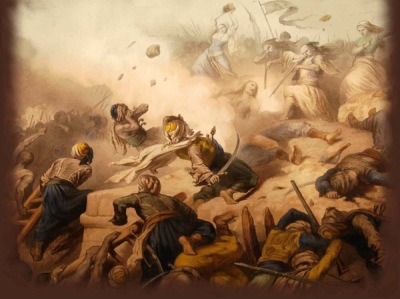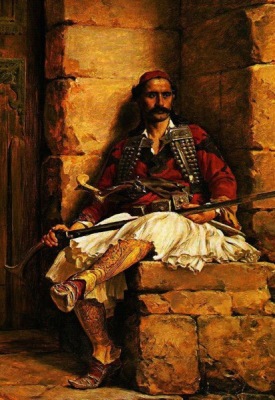Γράφε Ελληνικά και ας είναι και ανορθόγραφα.!!
Σε εποχές που βασιλεύει το ψέμα, η διάδοση της αλήθειας είναι πράξη επαναστατική .
ΔΕΝ ΕΚΠΡΟΣΩΠΩ ΚΑΝΕΝΑΝ ΚΑΙ ΔΕΝ ΜΕ ΕΚΠΡΟΣΩΠΕΙ ΚΑΝΕΙΣ.
«Ἐδῶ ζῆ, ἀναπνέει, πάλλεται, ἰδέα ΕΛΕΥΘΕΡΑ, γενναα, αποφασιστική».Το kentripotideas αποτελεί έναν ηλεκτρονικό δίαυλο διαφόρων άρθρων, τα οποία προέρχονται είτε προσωπικά είτε από ιστοσελίδες Εναλλακτικής Πληροφόρησης.
Απώτερος στόχος είναι η αφύπνιση του μέσου Έλληνα πολίτη μέσω της διάδοσης "μη πολιτικά ορθών" άρθρων, ερευνών, δοκιμίων και βίντεο.
Δεδομένου ότι ο σκοπός του παρόντος blog είναι MH ενημερωτικός και καθαρά ΨΥΧΑΓΩΓΙΚΟΣ, αν σας θίγει καθ'οποιονδήποτε τρόπο, επικοινωνήσετε μαζί μας για να επανορθώσουμε άμεσα. Όλα όσα ακολουθούν είναι προϊόντα της φαντασίας μας ή της δικής σας. Οποιαδήποτε ομοιότητα με πραγματικά πρόσωπα ή καταστάσεις είναι ΣΥΜΠΤΩΜΑΤΙΚΗ!
























Δεν υπάρχουν σχόλια:
Δημοσίευση σχολίου
Οι απόψεις του ιστολογίου μπορεί να μην συμπίπτουν με τα περιεχόμενα του άρθρου.
ΠΡΟΣΟΧΗ! Την ευθύνη για το περιεχόμενο των σχολίων φέρει αποκλειστικά ο συγγραφέας τους και όχι το blog. Η ανάρτηση των σχολίων μπορεί να έχει μια μικρή χρονική καθυστέρηση
"Διάβαζε όχι για ν' αντιλέγεις, να αμφισβητείς, ν' αναιρείς, να διαψεύδεις και ανασκευάζεις, όχι για να πιστεύεις, και να τα παίρνεις όλα για αλήθεια, άλλα για να κρίνεις και να εκτιμάς σωστά την κατάσταση και να σκέφτεσαι σαν λογικός άνθρωπος".
ΕΠΙΣΗΜΑΝΣΗ
Ορισμένα αναρτώμενα από το διαδίκτυο κείμενα ή εικόνες (με σχετική σημείωση της πηγής), θεωρούμε ότι είναι δημόσια. Αν υπάρχουν δικαιώματα συγγραφέων, παρακαλούμε ενημερώστε μας για να τα αφαιρέσουμε. Επίσης σημειώνεται ότι οι απόψεις του ιστολόγιου μπορεί να μην συμπίπτουν με τα περιεχόμενα του άρθρου. Για τα άρθρα που δημοσιεύονται εδώ, ουδεμία ευθύνη εκ του νόμου φέρουμε καθώς απηχούν αποκλειστικά τις απόψεις των συντακτών τους και δεν δεσμεύουν καθ’ οιονδήποτε τρόπο το ιστολόγιο.
Λίγα λόγια και σταράτα.
Ανεξάρτητο ιστολόγιο.
Δεν έχει σκοπό να θίξει τιμές και υπολήψεις, αλλά ούτε και να γλείψει κανέναν. Στόχος του είναι οι σάπιες νοοτροπίες, καταστάσεις, πολιτικές ..., αλλά και τα καλά θα λέγονται.
Γράφει η αφεντιά μου, φίλοι και συγγενείς.
Ευχαρίστως θα δημοσιεύσω άρθρα και σχόλια αναγνωστών.
Προσοχή όμως. Δεν τα πάω καλά με τα πρακτορικά και τα κατασκοπικά, αλλά αν υποψιαστώ πράκτορες-προβοκάτορες και λοιπούς... agents θα εκραγώ και... ούτε ψύλλος στον κόρφο τους. Ύβρεις και άλλα κακόβουλα αποτελούν επίσης αιτίες... έκρηξης.
Θα σας παρακαλούσα να είστε κόσμιοι στους χαρακτηρισμούς σας, επειδή είναι δυνατόν επισκέπτες του ιστολογίου να είναι και ανήλικοι.
Επίσης, όταν μας αποστέλλονται κείμενα (μέσω σχολίων ή ηλεκτρονικού ταχυδρομείου), παρακαλείσθε να αναγράφετε τυχούσα πηγή τους σε περίπτωση που δεν είναι δικά σας. Κάποιοι περιμένουν την ευκαιρία για να μας κατηγορήσουν για λογοκλοπή!!! Αγνοώντας βέβαια, πως στο παρόν ιστολόγιο αναγράφουμε ΠΑΝΤΑ την πηγή του κειμένου. Έτσι, παρακαλούμε για την αναγραφή της πηγής των κειμένων, για να αποφεύγονται παρεξηγήσεις. Ευχαριστούμε για την κατανόησή σας...
Υ.Γ.: Σχόλια τα οποία θα περιέχουν ύβρεις, θα αποκλείονται
ΘΑ ΣΑΣ ΠΑΡΑΚΑΛΟΥΣΑ ΝΑ ΜΗΝ ΧΡΗΣΙΜΟΠΟΙΕΙΤΕ ΤΙΣ ΥΠΕΡΣΥΝΔΕΣΕΙΣ (LINKS) ΠΟΥ ΠΙΘΑΝΟΤΑΤΑ ΝΑ ΑΦΗΝΟΥΝ ΚΑΠΟΙΟΙ ΣΤΑ ΣΧΟΛΙΑ. ΥΠΑΡΧΕΙ ΚΙΝΔΥΝΟΣ ΥΠΟΚΛΟΠΗΣ ΗΛΕΚΤΡΟΝΙΚΩΝ ΣΑΣ ΣΤΟΙΧΕΙΩΝ ΚΑΙ ΔΕΔΟΜΕΝΩΝ.
1. Φράσεις όπως f**ck you, suck my d**ck, take head etc επιτρέπονται μόνο αν απευθύνονται σε λαμόγια της πολιτικής και το lifestyle
2. Ta agglika epitreponte mono gia xioumoristikous logous i, otan imetha vevei oti to istologiο diavazi h Mrs Diamantopoulou h o von Droutsas
kentripotideas.blogspot.gr/ δεν φέρει ευθύνη για τα σχόλια που αναρτώνται στην ιστοσελίδα του. Ωστόσο, οφείλει να διαγράφει σχόλια που το περιεχόμενό τους είναι απειλητικό, προσβλητικό, χυδαίο, βίαιο ή υβριστικό προς άλλους σχολιαστές ή την ίδια ομάδα του site.
Από εδώ και στο εξής κανείς δεν θα μπορεί να σχολιάσει χωρίς να έχει συνδεθεί είτε μέσω facebook, twitter, google plus, η με λογαριασμό disqus.
Για επικοινωνία στείλτε e-mail στο kentripotideas@gmail.com